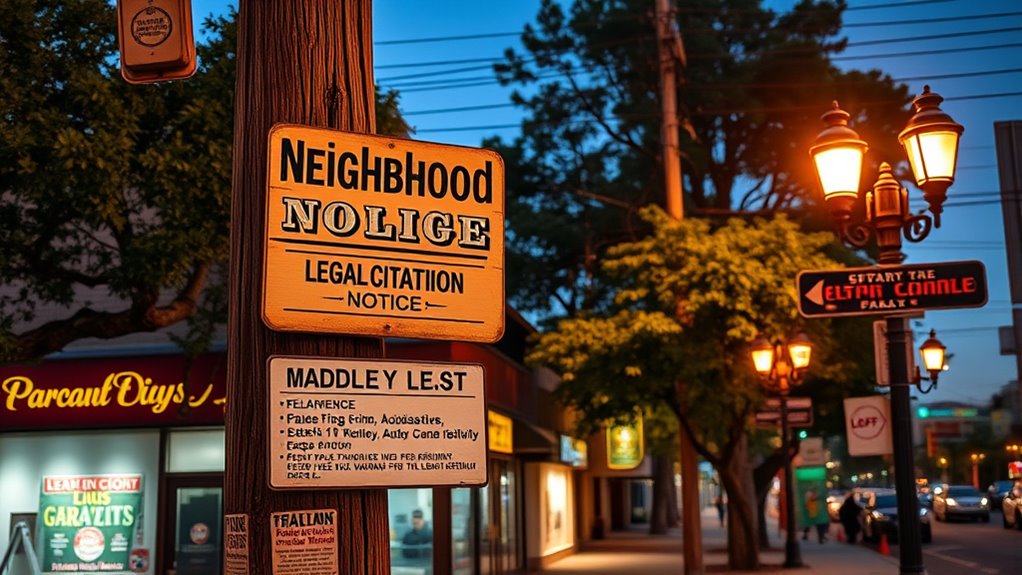Understanding local ordinances before you vanish helps you stay lawful and avoid surprises. You should be aware of parking rules, noise limits, and property use regulations in your community. Ignoring these lines can lead to fines, towing, or legal trouble, which can ruin your plans. By knowing the current rules, you’ll be better prepared and respectful of your community’s standards. Keep going to uncover more tips on how to stay compliant and stress-free.
Key Takeaways
- Review local ordinances related to parking, noise, and property use before leaving to avoid violations.
- Stay updated on recent regulation changes by checking city websites or posted signs.
- Understand permissible activities within your community to prevent fines or legal issues.
- Respect community standards by adhering to quiet hours, parking rules, and other restrictions.
- Being informed about legal boundaries ensures peace of mind and helps avoid unexpected penalties.

Legal lines define the boundaries of what’s permissible and what’s not within the justice system. These boundaries are outlined through local ordinances that govern everyday activities, helping maintain order and safety in your community. When you’re planning to vanish for a while, whether it’s a short trip or an extended stay, understanding these legal lines becomes essential. Ignoring them can lead to fines, penalties, or even legal trouble that’s avoidable if you’re informed.
One of the most common issues you’ll encounter involves parking regulations. These rules specify where you can and cannot leave your vehicle, often marked by signs, painted lines, or posted notices. For example, parking in a no-parking zone or exceeding the time limit in a designated area can result in tickets or towing. Before you leave, make sure you’re aware of the parking regulations on your street or in the lot. It’s tempting to think that since you’re not around, no one will notice, but parking violations can be enforced even when you’re away, complicating your plans or causing unexpected costs when you return.
Parking violations can be enforced even when you’re away, risking tickets or towing and unexpected costs.
Noise ordinances form another essential part of local legal lines. These rules set acceptable noise levels and quiet hours, usually during late-night or early-morning periods. If you’re hosting a party, setting up construction, or even just playing music, you need to stay within the limits defined by your neighborhood’s noise ordinances. Violating these rules can lead to complaints from neighbors, citations from law enforcement, or other penalties. Being mindful of noise ordinances ensures you keep good community relations and avoid unnecessary trouble while you’re gone.
Understanding these local ordinances isn’t just about avoiding penalties; it’s about respecting your community’s standards. Many cities and towns update their regulations periodically, so it’s wise to check current rules before you leave. This might mean reviewing city websites, contacting local authorities, or simply observing posted signs. By doing so, you minimize the risk of inadvertently breaking the law and facing consequences that could interfere with your plans. Additionally, knowing the specific local regulations regarding property and safety can help you better prepare for any situation that might arise in your absence.
In essence, knowing where the legal lines are drawn in your community helps you plan better and stay compliant. Whether it’s parking regulations or noise ordinances, respecting these rules demonstrates good neighborliness and prevents unnecessary headaches. When you’re aware of these boundaries, you can vanish peacefully, confident that you’re not stepping into legal gray areas. Being informed lets you enjoy your time away without the worry of surprise citations or disputes that could have been easily avoided.
Frequently Asked Questions
How Can I Find Local Ordinances Online?
You can find local ordinances online by visiting your city or county government websites. Look for sections like zoning restrictions and signage requirements, which often detail rules for businesses. Many municipalities also offer searchable databases for ordinances. If you don’t find what you need, try contacting your local planning department directly. Staying informed helps you comply with regulations and avoid potential fines or issues when you establish or run your business.
Are There Penalties for Violating Small Town Ordinances?
Did you know that over 60% of small towns enforce ordinance penalties strictly? If you violate a city or town ordinance, you could face fines, community service, or even court appearances. Penalties aim to promote community compliance and maintain order. Ignoring local rules can lead to escalating consequences, so it’s best to stay informed and adhere to all ordinances to avoid unnecessary trouble and guarantee you’re a responsible community member.
Who Enforces Local Regulations on Business Closures?
You need to know that local authorities enforce regulations on business closures, including zoning restrictions and noise ordinances. When you decide to shut down your business, city or town officials make sure you follow these rules to prevent issues like illegal land use or excessive noise. They have the authority to issue citations or fines if you violate ordinances, so it’s essential to stay compliant during the closure process.
Can I Get a Permit to Bypass Certain Ordinances?
You might wonder if you can get permit exceptions or ordinance waivers to bypass certain local regulations. While some jurisdictions offer these options, they typically require an application and approval process, demonstrating valid reasons for the exception. You should contact your local permitting office or regulatory agency to learn about specific procedures, eligibility criteria, and whether your situation qualifies for permit exceptions or ordinance waivers.
How Often Do Local Laws Change Regarding Business Operations?
Think of local laws as a river that’s constantly shifting its course. You ask how often they change—well, it varies, but zoning restrictions and licensing requirements can update annually or even more frequently. Staying current means regularly checking with local government websites or authorities. You don’t want your business plans to hit a snag just because a law shifted unexpectedly. Keep your finger on the pulse to navigate smoothly.
Conclusion
Remember, knowing your local ordinances can save you from a legal quagmire—think of it as your own personal “DeLorean” back to a smoother, hassle-free business journey. Ignoring these rules is like trying to outrun a knight on a quest; you might think you’re swift, but the law’s got armor. So, stay informed, plan wisely, and keep your business on the right side of the law, or risk ending up in a legal “black hole” you can’t escape.











